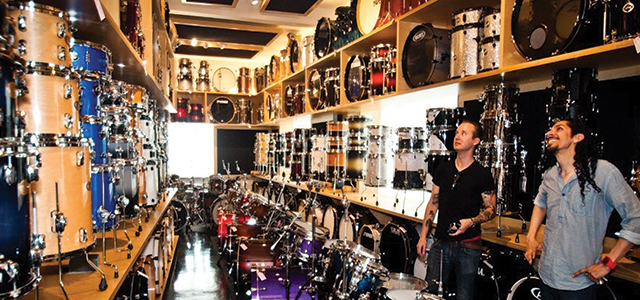Vic’s Drum Shop might be the biggest dedicated drum store in North America, but it would hardly be a surprise if you missed it on your last trip to Chicago.
“We’re near the L train and the expressway, and we’re practically in the heart of downtown, so the store is easy to get to,” said Victor Salazar, Owner of Vic’s Drum Shop. “But, we’re located on a dead-end street with no storefront window. You’d never drive by us.”
Vic’s Drum Shop is hidden in plain sight on the ground floor of the Music Garage, a facility with rehearsal rooms that are rented by musicians. The limitations presented by this unconventional location have allowed Salazar to be creative in his marketing efforts—as well as store layout and merchandising—and it’s all helped to make Vic’s Drum Shop a must see for all musicians who are “in the know.”
“We’ve had customers come from all over the world: places like Italy, Denmark, Mexico and Israel. People find us because they have heard of us or Googled us,” said Salazar, who personally runs the store’s social-media accounts. “I’ve been running a grassroots campaign to get the word out. We have 15,000 likes on Facebook. I post on there from my phone in real time, and people seem to like the content. I get a lot of compliments because we feature more people than products, so our customers don’t feel like they are being sold to.”
Even if the Vic’s Drum Shop social-media pages don’t feature a lot of products, the shop itself certainly does. When Salazar opened the business in 2011, there hadn’t been a dedicated drum shop in Chicago since 1993. He wanted to bring back the gear-shopping experience he had in his youth.
“Growing up, there were two drum shops in town and, between the two, they had everything. So, I wanted to do that here and have all things at all price points for everyone,” Salazar explained. “That way, it lets the customers try out things they may not find elsewhere.”
In order to manage his store’s massive inventory, Salazar divided the 10,000-square-foot space into a series of rooms dedicated to product categories; these include cymbals, heads, percussion, and acoustic and electronic kits.
“We have nine separate showrooms, and salespeople move between the stations and have walkie-talkies,” said Salazar. “So, you go into our drumstick room and there are 800 models of sticks. But, it’s all sticks, so there are no distractions. Despite having a heavy inventory, it’s not overwhelming. The organization plays a big part in that.”
Although the organization of the store helps to create a controlled version of what Salazar calls “a wow factor,” it also helps to solve another issue that plagued the drum stores of his youth: noise.
“Typically, stores are laid out as one big room, but the drums are so loud. Someone can be trying out a cymbal next to a customer with a snare, all while an employee is on the phone. It’s sonic chaos,” said Salazar. “So, I wanted to eliminate that by creating separate shopping environments…similar to a high-end tech store. Each room has treatment on the walls so you can hear.”
So, between all the customers looking at all the merchandise in all the different rooms, where does Salazar see the most activity? “The cajon has become a huge trend,” Salazar said. “More customers are asking for them and more manufacturers are making them. The customers often mispronounce it, but they’ve seen one and they want one. It’s similar to how popular the djembe was 12 years ago.”
Another trend he’s seen, which extends across many of the instrument sub-categories Vic’s Drum Shop carries, is an interest in goods that are more durable.
“Customers can’t afford to replace things like sticks and heads as often, so they ask for the ones that last longer,” he said. “It’s a way of watching their pocketbooks.”
Salazar has noticed manufacturers reacting to this trend, creating longer-lasting gear like the Emperor X drumhead from Remo or the Triple Threat by Aquarian.
“I’ve seen bamboo sticks from Boso do well because of their durability, even if they don’t feel like wood,” Salazar added. “Vic Firth has a synthetic stick that’s relatively indestructible. It sells for $50 per pair, but you’ll save money in the long run.”
Because the store carries such a large inventory, Salazar said sales have yet to plateau, which is a good thing given that instrument sales are the store’s principal generator of income. Additional sources of revenue include a repair shop and a lessons program. Three teachers are on staff for one-on-one lessons and, in addition, the store offers master classes and clinics from celebrity drummers, many of whom frequent the store because of its extensive inventory and convenient location.
“We see famous drummers in here about three to four times per week,” said Salazar. “The drummer from Phish and the drummer for Jack White have stopped by, as has Will Calhoun from Living Colour. It reminds me of when I was a kid and I would go to the music store and bump into a famous artist hanging out at the local drum shop. It makes us look very good.”
Now celebrating its third year in business, Vic’s Drum Shop is a “culmination of my life’s experience and passion,” said Salazar, who has been a drummer since age eight and a retail professional since he got his first job working at a newsstand at age 11. Looking ahead, he’d love to bring that dream to other cities that he feels really need a dedicated drum shop.
“When I fine-tune things here in Chicago, I’ll be able to duplicate it and open elsewhere,” he said, his motivation driven by the observation that “the independent drum shop is a dying breed.”



